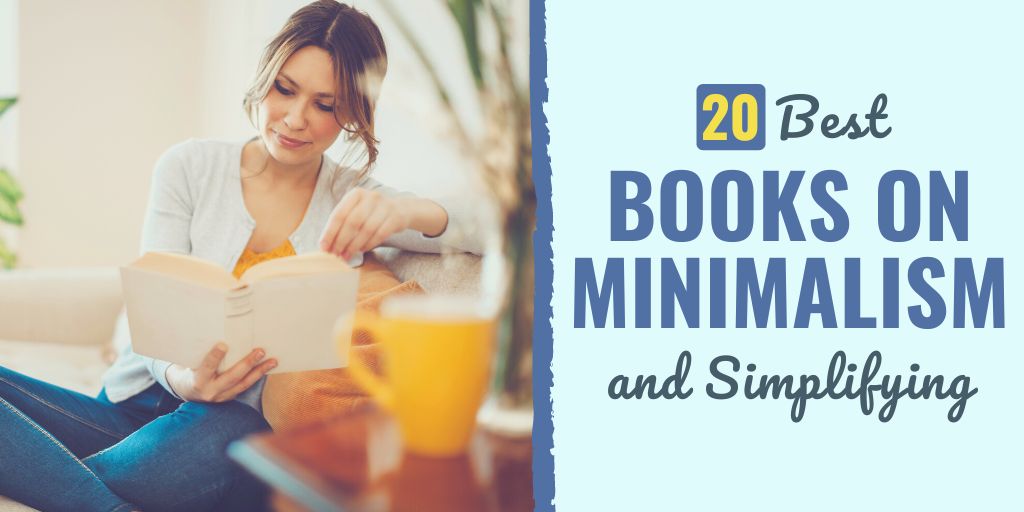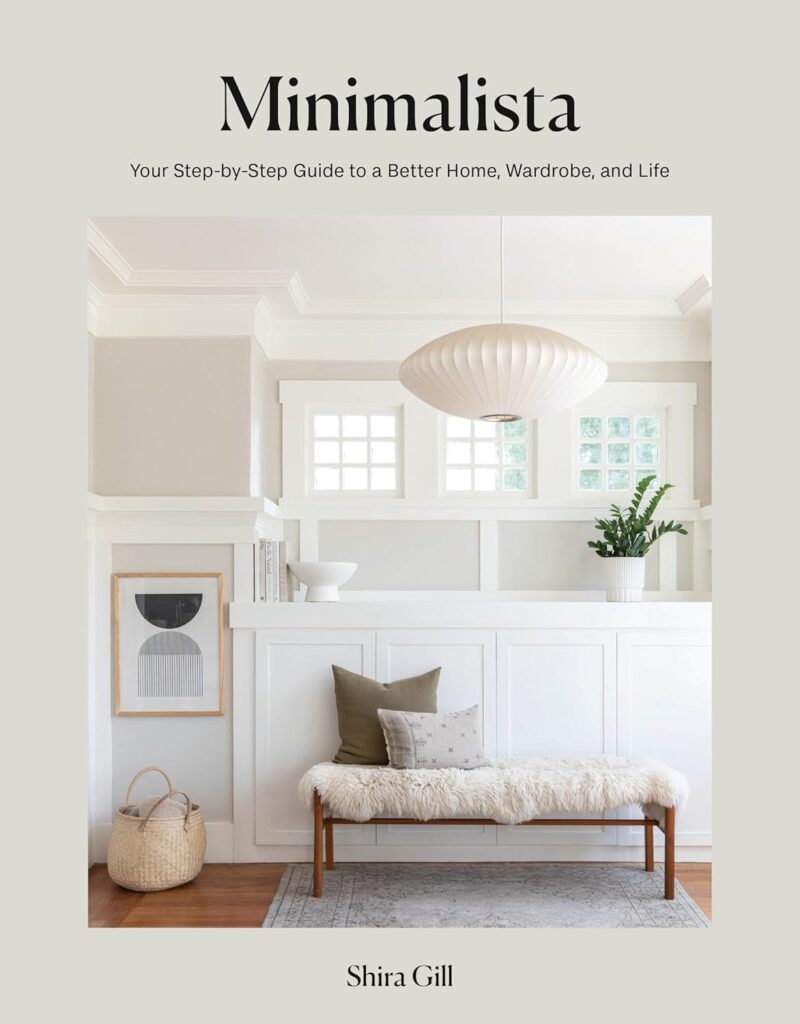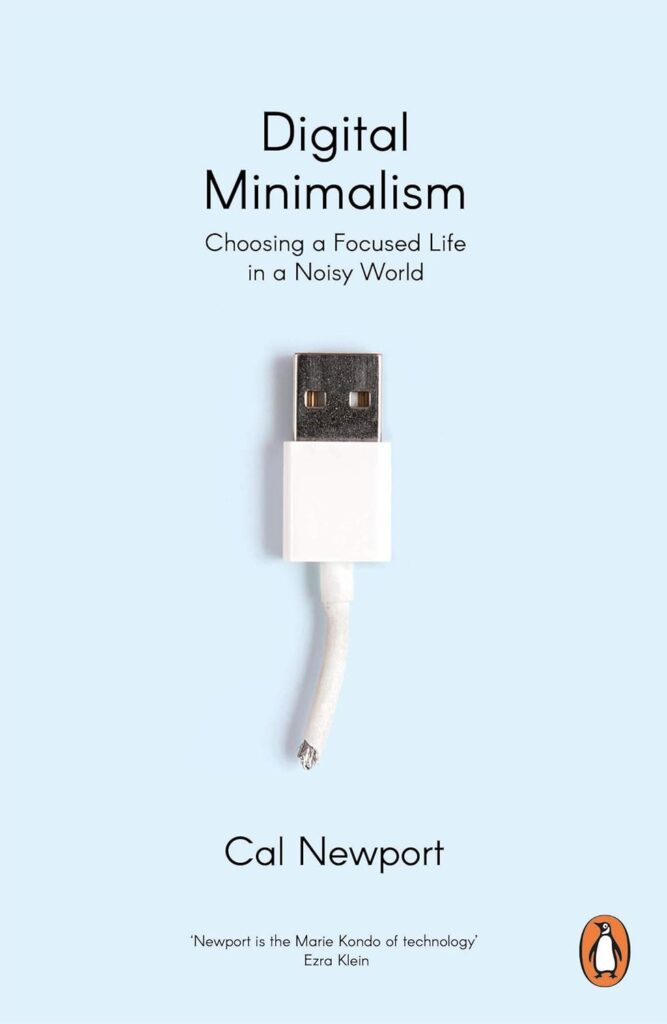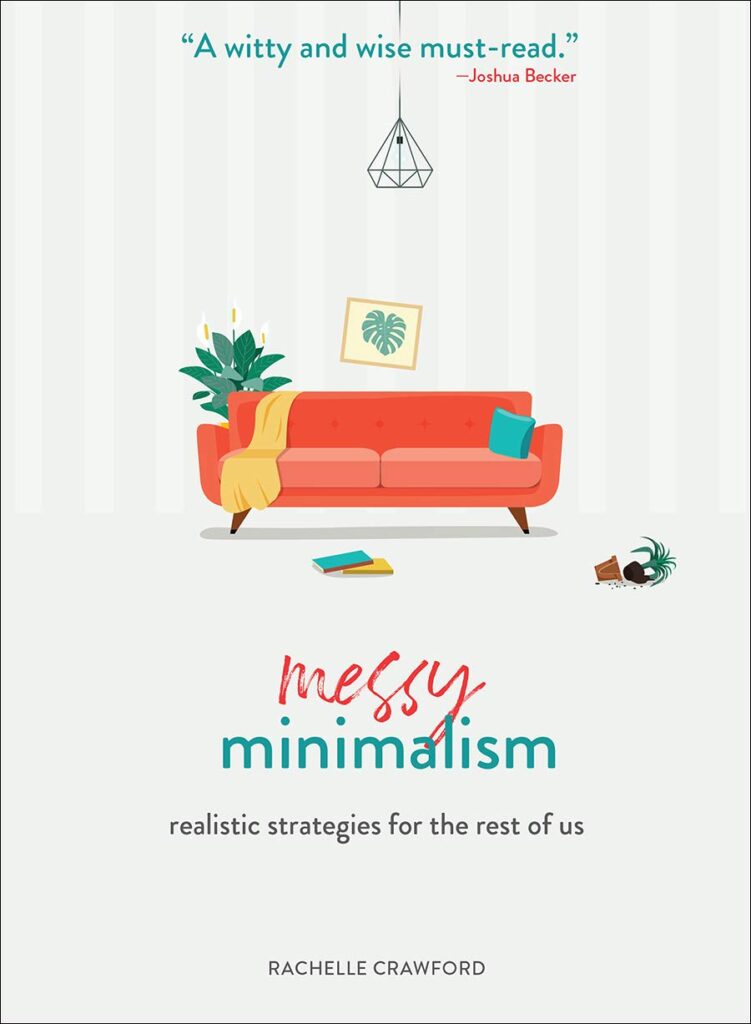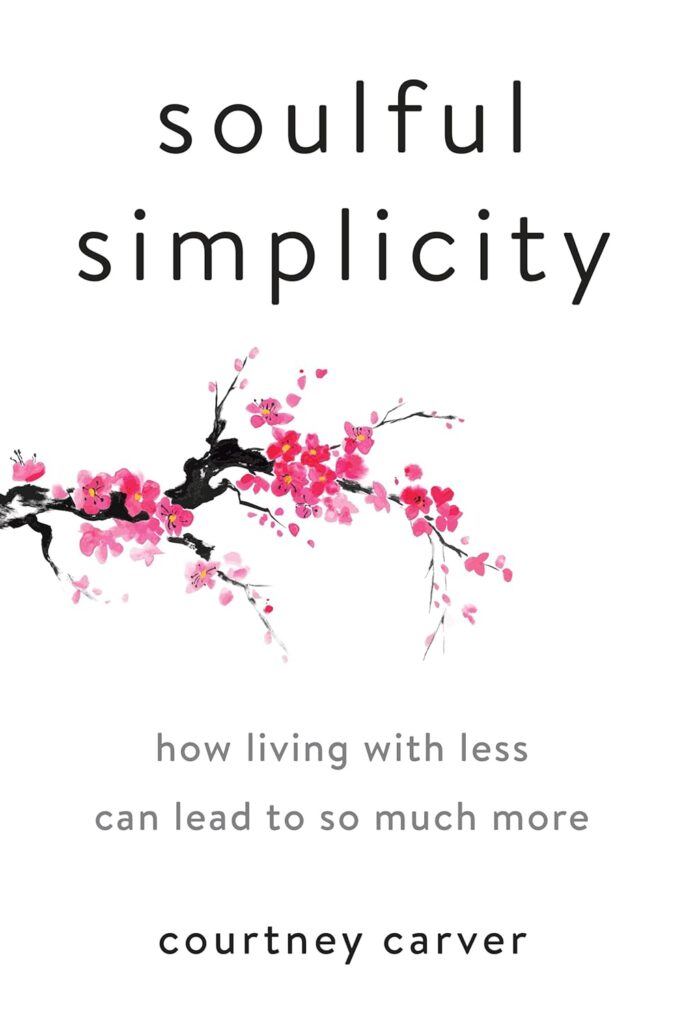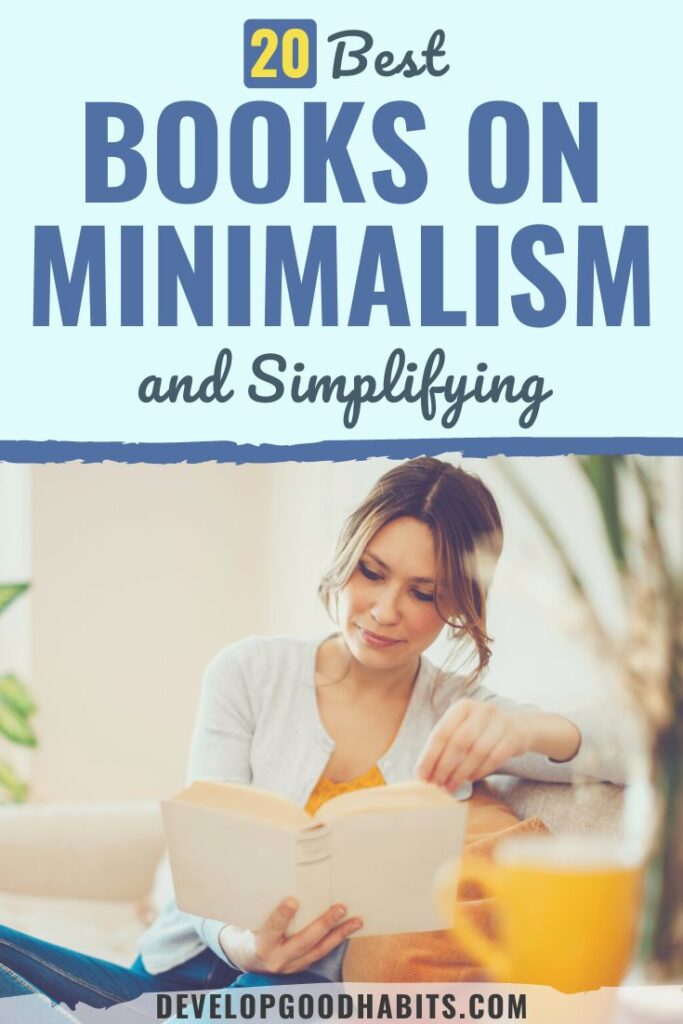There might be affiliate links on this page, which means we get a small commission of anything you buy. As an Amazon Associate we earn from qualifying purchases. Please do your own research before making any online purchase.
Looking for the best books on minimalism?
You may have heard that minimalism changes life for the better, especially these days, when many of us are obsessed with consumerism and the drive to have more (earn more, spend more, achieve more, etc.).
Perhaps you’re already worn out from the aimlessness of it all, and simply want a life filled with meaning and purpose, but are at a loss as to where to start.
Today’s post features the best minimalist books to help you start simplifying your life.
Perhaps you’re wondering:
The books featured today provide the answers to these questions (and more) about minimalism and the minimalist lifestyle.
Let’s get started!
Best Books on Minimalism and Simplifying
1. Essentialism by Greg McKeown
Check Price on Amazon (Paperback)
Check Audiobook Price
Check Price on Amazon Kindle
Takeaways:
- Essentialism advocates for the disciplined pursuit of less, encouraging individuals to focus on what truly matters and eliminate non-essential activities and commitments.
- The book highlights the significance of discernment and saying no to distractions in order to channel energy and resources towards the most meaningful endeavors.
- McKeown emphasizes the value of prioritization and trade-offs, illustrating how making deliberate choices can lead to greater effectiveness and fulfillment.
- Essentialism explores the concept of “less but better,” promoting the idea of quality over quantity and the benefits of simplifying one's life and work.
- The book underscores the transformative impact of embracing essentialism, from enhancing productivity and creativity to fostering a sense of purpose and well-being.
Essentialism: The Disciplined Pursuit of Less teaches you how to make the right choices when it comes to spending your time, effort, and other resources. Through the practice of essentialism, Greg McKeown believes that each of us can make a positive contribution to create a richer and more meaningful life. (Read our review of Essentialism here.)
Essentialism is choosing only what really matters.
These are some of the takeaway statements from the book:
The book is a must-read for those who may be feeling stretched thin with all the demands of work and personal life—especially those in leadership or managerial positions.
2. The Year of Less by Cait Flanders
Check Price on Amazon (Paperback)
Check Audiobook Price
Check Price on Amazon Kindle
Takeaways:
- The Year of Less chronicles Flanders' personal journey of embracing minimalism and intentional living, showcasing the transformative power of consuming less and simplifying one's life.
- Flanders shares practical insights into decluttering, mindful spending, and breaking free from the cycle of overconsumption, offering inspiration for those seeking a more purposeful and sustainable lifestyle.
- The book delves into the emotional and psychological aspects of decluttering and letting go of excess possessions, highlighting the liberating effects of releasing attachments to material goods.
- Flanders explores the connection between mindful consumption and overall well-being, illustrating how conscious choices around spending and possessions can lead to greater contentment and fulfillment.
- The Year of Less underscores the value of self-reflection and self-discovery in the pursuit of a simpler, more meaningful life, inspiring readers to reevaluate their priorities and embrace a lifestyle aligned with their values.
We live in an age of mass consumerism. The jobs we work endless hours at help us earn more so we can spend more. But there comes a time when we wonder what lies beyond this seemingly senseless cycle of earning and spending.
The Year of Less: How I Stopped Shopping, Gave Away My Belongings, and Discovered Life Is Worth More Than Anything You Can Buy in a Store is a perfect guide for starting to cut back on consumerism.
In her book, millennial blogger Cait Flanders shares her experience of imposing a shopping ban on herself for a period of 12 months.
The book details this year-long journey towards a richer and more meaningful life. Flanders’ experiences will help you focus on what you truly value. Hopefully, you will find your own path full of purpose, too.
3. Minimalism by Joshua Fields Milburn and Ryan Nicodemus
Check Price on Amazon (Paperback)
Check Audiobook Price
Check Price on Amazon Kindle
Takeaways:
- Minimalism advocates for intentional living and the pursuit of less material possessions, promoting the idea that true fulfillment comes from experiences and meaningful relationships rather than belongings.
- The book explores the transformative effects of decluttering and simplifying one's life, emphasizing the mental and emotional benefits of letting go of excess and focusing on what truly matters.
- Milburn and Nicodemus share practical strategies for embracing minimalism, from reevaluating consumption habits to redefining success and happiness on one's own terms.
- Minimalism delves into the environmental impact of consumerism and the potential for reducing waste and living more sustainably through mindful consumption.
- The book underscores the link between minimalism and mental clarity, illustrating how simplifying one's surroundings and commitments can lead to greater peace of mind and a sense of purpose.
Do you ever wonder how minimalists live their lives? Minimalism: Live a Meaningful Life showcases how two guys live as minimalists in the midst of a world obsessed with consumerism.
First published in 2016, this book by Joshua Fields Milburn and Ryan Nicodemus isn’t a how-to for going minimalist. Instead, it showcases what it really means to embrace a life of minimalism.
Readers are introduced to the “Five Values” that define what minimalism is for the authors. Interestingly, these values do not discuss how to get rid of stuff. Rather, they teach you how you can live meaningfully.
These values aim to refocus your attention on things that truly matter. For the authors, this means:
4. The More of Less by Joshua Becker
Check Price on Amazon (Paperback)
Check Audiobook Price
Check Price on Amazon Kindle
Takeaways:
- The More of Less advocates for embracing minimalism as a means to find more fulfillment and freedom by owning less and focusing on what truly matters in life.
- Becker emphasizes the transformative power of decluttering and simplifying, highlighting the positive impact it can have on mental well-being and overall quality of life.
- The book provides practical guidance on how to adopt a minimalist lifestyle, from reevaluating consumption habits to decluttering living spaces and redefining priorities.
- Becker explores the environmental benefits of minimalism, shedding light on how reducing consumption and waste can contribute to a more sustainable and eco-friendly lifestyle.
- The More of Less underscores the connection between minimalism and personal growth, illustrating how letting go of excess possessions and distractions can lead to greater clarity, purpose, and contentment.
By now, you probably realize that having more stuff does not necessarily make us happier. In fact, the clutter can cause us to become more agitated. Our possessions distract us from working on achieving what truly matters in our lives.
The More of Less: Finding the Life You Want Under Everything You Own gives you a chance to make room for the things you really want in life.
Specifically, the book is your guide for:
If you need a book to walk you through the process of living a minimalist life, this one from Joshua Becker does the job very well.
5. The Joy of Less, a Minimalist Living Guide by Francine Jay
Check Price on Amazon (Paperback)
Check Audiobook Price
Check Price on Amazon Kindle
Takeaways:
- The Joy of Less advocates for simplifying one's living space and possessions to cultivate a more intentional and fulfilling lifestyle, focusing on quality over quantity.
- Jay provides practical advice on decluttering and organizing, offering a step-by-step approach to minimizing possessions and creating a harmonious living environment.
- The book emphasizes the mental and emotional benefits of minimalism, illustrating how letting go of excess can lead to reduced stress, increased clarity, and a greater sense of well-being.
- Jay explores the concept of mindful consumption and intentional living, highlighting the importance of aligning possessions with personal values and priorities.
- The Joy of Less underscores the transformative nature of minimalism, from freeing up physical space to creating room for personal growth, creativity, and meaningful experiences.
Perhaps one of the most important lessons that the coronavirus pandemic has taught the world is that we have gone overboard without consumerism and it’s time to slow down and focus on living simply yet meaningfully.
If you’re searching for a guide on how to transition from a highly materialistic lifestyle to an uncluttered simple way of life, The Joy of Less, a Minimalist Living Guide: How to Declutter, Organize, and Simplify Your Life from Francine Jay might be the right choice.
The book will guide you on how to categorize every item you own, helping you develop a sense of detachment from your personal belongings.
You’ll be guided to STREAMLINE, a system of de-cluttering conceptualized by the author, which stands for:
S – Start over
T – Trash, treasure, or transfer
R – Reason for each item
E – Everything in its place
A – All surfaces clear
M – Modules
L – Limits
I – If one comes in, one goes out
N – Narrow down
E – Everyday maintenance
A takeaway from the book that you can apply in your life right now is to act as if you’re permanently moving overseas. This counsel may help prevent you from accumulating clutter and, hopefully, keep your home tidy for a longer period of time.
6. The Life-Changing Magic of Tidying Up by Marie Kondo
Check Price on Amazon (Paperback)
Check Audiobook Price
Check Price on Amazon Kindle
Takeaways:
- The Life-Changing Magic of Tidying Up introduces the KonMari method, emphasizing the transformative power of decluttering and organizing possessions by category.
- Kondo advocates for keeping only items that spark joy, encouraging readers to evaluate their belongings based on emotional attachment and personal significance.
- The book highlights the connection between tidying and mental well-being, illustrating how a clutter-free environment can lead to a sense of calm and clarity.
- Kondo provides practical guidance on decluttering and organizing, offering a systematic approach to tidying that focuses on simplicity and mindfulness.
- The Life-Changing Magic of Tidying Up underscores the long-term impact of tidying, from creating a more harmonious living space to fostering a mindset of gratitude and appreciation for one's belongings.
Are you overwhelmed by the clutter in your home?
Perhaps you’ve already tried many techniques for de-cluttering, organizing, and storing your stuff, but none of them have shown permanent results in your fight against clutter.
Marie Kondo gives you a new perspective on tidying up. She believes that in order to be successful at it, one has “to tidy everything, all at once.”
Kondo’s technique guarantees that there will be no rebounds. This is because once readers arrange their homes according to Kondo’s technique, they are surrounded only by the things they love.
When it comes to deciding what personal possessions to discard or keep, one simply has to answer the question, “Does it spark joy?”
If you are looking for a guide on organizing with intention, Kondo’s book, The Life-Changing Magic of Tidying Up: The Japanese Art of Decluttering and Organizing, is for you.
7. Goodbye, Things by Fumio Sasaki
Check Price on Amazon (Paperback)
Check Audiobook Price
Check Price on Amazon Kindle
Takeaways:
- Goodbye, Things advocates for the benefits of minimalism, emphasizing the freedom and contentment that come from owning fewer possessions and simplifying one's life.
- Sasaki shares his personal journey of decluttering and minimizing, offering insights into the mental and emotional transformation that accompanies letting go of excess belongings.
- The book explores the link between minimalism and mindfulness, highlighting how reducing physical clutter can lead to greater mental clarity and a deeper appreciation for the present moment.
- Sasaki provides practical tips for decluttering and reevaluating one's relationship with material possessions, encouraging readers to prioritize experiences and personal growth over accumulation.
- Goodbye, Things underscores the potential for minimalism to foster a more intentional and fulfilling lifestyle, from reducing stress and decision fatigue to creating space for meaningful pursuits and connections.
If you are continually stressed out and have fallen into the habit of comparing yourself with others, you might be interested to know that author Fumio Sasaki felt that way too—until he decided to make a drastic move that changed his life for the better.
Sasaki decided to say goodbye to stuff he didn’t need. He went from being a “messy maximalist” to a minimalist. While doing so, he gained a lot of insight into what makes for a fulfilling life.
In Goodbye, Things: The New Japanese Minimalism, he shares his experience of living with less, or what he calls the “new Japanese minimalism.” His credits his minimalist life with helping him keep a tidy apartment, avoid compulsive shopping habits, and even lose weight.
8. A Monk's Guide to a Clean House and Mind by Shoukei Matsumoto

Check Price on Amazon (Paperback)
Check Audiobook Price
Check Price on Amazon Kindle
Takeaways:
- A Monk's Guide to a Clean House and Mind emphasizes the connection between a tidy living environment and mental well-being, offering insights from a monk's perspective on the transformative power of cleanliness.
- Matsumoto provides practical tips for decluttering and cleaning, drawing parallels between physical tidiness and inner peace, and highlighting the meditative nature of household chores.
- The book delves into the mindfulness and intentionality behind maintaining a clean living space, illustrating how simple acts of tidying can contribute to a sense of harmony and tranquility.
- Matsumoto shares the concept of “shouji,” which means treating objects with respect and gratitude, encouraging readers to cultivate a mindful relationship with their belongings.
- A Monk's Guide to a Clean House and Mind underscores the potential for a clean and organized environment to support mental clarity, emotional balance, and a deeper appreciation for everyday life.
In case you weren’t aware, cleaning well is one of the cardinal skills that Buddhist monks must possess. In A Monk's Guide to a Clean House and Mind, Buddhist monk Shoukei Matsumo provides essential tips for cleaning and tidying up your house as Zen monks would do.
Matsumo’s cleaning tips include:
Matsumo’s aim goes beyond sharing cleaning and tidying tips. He believes that the act of tidying up also helps people achieve a more peaceful state of mind and contemplate the self.
9. 7 by Jen Hatmaker
Check Price on Amazon (Paperback)
Check Audiobook Price
Check Price on Amazon Kindle
Takeaways:
- The book 7 by Jen Hatmaker encourages readers to simplify their lives by focusing on seven areas: food, clothes, possessions, media, waste, spending, and stress.
- Hatmaker shares her personal experiences and challenges readers to consider how consumerism and excess impact their lives and the world around them.
- The book offers practical tips and strategies for decluttering and simplifying in each of the seven areas, helping readers to live more intentionally and in line with their values.
- Through humor and vulnerability, Hatmaker invites readers to reflect on their own habits and attitudes towards consumption and encourages them to make positive changes.
- 7 is a thought-provoking and inspiring read that motivates readers to reevaluate their priorities and embrace a more meaningful and fulfilling way of life.
7: An Experimental Mutiny Against Excess (Updated and Revised) tells the story of one family’s attempt to go against the culture of overindulgence and excessive consumerism.
In the book, Jen Hatmaker shares how she, her husband, and her children spent seven months determining areas of their lives where they were prone to excesses, and then making a conscious effort to fight against these excesses in:
Hatmaker describes her family’s experience as a “spiritual journey” that taught them the value of simplicity and generosity in creating a richer life.
10. The Minimalist Mindset by Danny Dover
Check Price on Amazon (Paperback)
Check Audiobook Price
Check Price on Amazon Kindle
Takeaways:
- The book explores the principles of minimalism and offers practical strategies for applying them to various aspects of life, including possessions, time, and relationships.
- Dover emphasizes the importance of intentional living and highlights the benefits of decluttering, simplifying, and prioritizing what truly matters to achieve greater fulfillment and freedom.
- The book provides actionable steps for cultivating a minimalist mindset, such as setting clear goals, practicing gratitude, and developing habits that align with minimalist values.
- Dover encourages readers to reevaluate their consumption habits, embrace simplicity, and let go of the excess to create space for what brings genuine joy and purpose.
- The Minimalist Mindset serves as a guide for individuals seeking to break free from the pressures of materialism and busyness, offering a roadmap to a more deliberate and meaningful way of living.
If you are looking for a step-by-step guide to the minimalist lifestyle, The Minimalist Mindset: The Practical Path to Making Your Passions a Priority and to Retaking Your Freedom written by Danny Dover is worth a read.
It isn’t a book about de-cluttering, nor is it about the philosophical aspects of minimalism. Instead, this book shares the habits you need to implement in your life so you can prioritize the things you truly love and enjoy real personal freedom.
Dover describes minimalism as “the constant art of editing your life.” Within the pages of the book, you’ll find tips on how to:
11. Cami Kangaroo Has Too Much Stuff! by Stacy C. Bauer (author) and Rebecca Sinclair (illustrator)
Check Price on Amazon (Paperback)
Check Price on Amazon Kindle
Takeaways:
- Cami Kangaroo Has Too Much Stuff! is a children's book that addresses the theme of excess and the importance of decluttering.
- The story follows Cami Kangaroo, who learns valuable lessons about the consequences of having too many possessions and the benefits of letting go of unnecessary stuff.
- Through engaging illustrations and relatable scenarios, the book communicates the idea of simplifying and prioritizing, encouraging young readers to consider the value of experiences over material things.
- Cami Kangaroo Has Too Much Stuff! promotes the concept of mindful consumption and the joy of sharing with others, fostering an early understanding of the benefits of living with less.
- The book serves as a lighthearted and impactful tool for starting conversations with children about the significance of managing belongings and appreciating what truly matters.
If you’re a parent of school-age children, you can most likely relate to the perpetual mess of kids’ rooms and the mountains of stuff they seem to leave all over the house.
Cami Kangaroo Has Too Much Stuff! is a wonderful way to introduce the idea of organizing and owning less to children. The engaging narrative and attractive illustrations help bring the message home to children aged 4 to 8.
Stacy Bauer wrote the story based on the state of her own daughter’s bedroom.
In the story, the young kangaroo named Cami loves to collect stuff. However, she does not know how to organize her personal treasures, and has difficulty finding things because of the clutter. How will she find the toy she needs to return to her cousin when she can’t find it under all the mess?
The book has been called “Marie Kondo for kids.” It is one of the best books for helping children develop a minimalist mindset.
12. Present Over Perfect by Shauna Niequist
Check Price on Amazon (Paperback)
Check Audiobook Price
Check Price on Amazon Kindle
Takeaways:
- Present Over Perfect encourages readers to prioritize presence, connection, and authenticity over the pursuit of perfection and busyness.
- Niequist shares personal anecdotes and reflections on her own journey towards embracing a slower, more intentional way of living, inspiring readers to do the same.
- The book delves into the themes of self-care, setting boundaries, and finding fulfillment in the simple moments, offering a refreshing perspective on living a more meaningful and balanced life.
- Niequist's writing invites readers to reevaluate their values, relationships, and priorities, nudging them towards a deeper sense of purpose and contentment. Present Over Perfect serves as a gentle reminder to slow down, savor life's experiences, and cultivate a deeper connection with oneself and others, ultimately leading to a more fulfilling and authentic existence.
Is life too hectic right now? Have you been forced into committing to something that’s against your personal principles, all in the name of pleasing others?
Present Over Perfect: Leaving Behind Frantic for a Simpler, More Soulful Way of Living is an invitation to examine your true priorities. What would life be like if you were striving to be more present instead of being perfect?
Niequist’s message is presented in a collection of essays that tell of her journey of leaving a frantic way of life to arrive at a life lived with mindfulness.
The author hopes that readers will be able to arrive at a life she envisions for everyone—one filled with grace, moments of rest, simplicity, and true connections.
13. It’s All Too Much by Peter Walsh
Check Price on Amazon (Paperback)
Check Audiobook Price
Check Price on Amazon Kindle
Takeaways:
- It’s All Too Much offers practical advice and strategies for decluttering and organizing living spaces, helping readers to regain control and create a more harmonious environment.
- Walsh emphasizes the emotional and psychological impact of clutter, guiding readers to recognize the connection between their surroundings and their overall well-being.
- The book provides step-by-step instructions for tackling clutter, letting go of unnecessary items, and establishing sustainable organizational systems, empowering readers to transform their living spaces.
- Walsh's approach focuses on addressing the root causes of clutter and developing a mindset shift towards intentional consumption and mindful living.
- It’s All Too Much equips readers with the tools and motivation to simplify their homes, reduce stress, and cultivate a sense of calm and clarity, ultimately leading to a more balanced and fulfilling lifestyle.
In It’s All Too Much: An Easy Plan for Living a Richer Life With Less Stuff, author Peter Walsh shows you how to take control of clutter in order to get more out of life. He introduces a system that helps you achieve what you’ve envisioned your life to be.
This book explains the underlying reasons why we’re prone to clutter, and the reason for getting rid of it. Furthermore, it provides tips on how you can go about de-cluttering and organizing your personal space.
For some readers, this book gives them permission to finally toss mementos that have been lying around in their homes for years, accumulating dust and occupying space that could have been used more meaningfully.
14. The Joy of Missing Out by Tonya Dalton
Check Price on Amazon (Paperback)
Check Audiobook Price
Check Price on Amazon Kindle
Takeaways:
- The Joy of Missing Out advocates for intentional decision-making and prioritizing what truly matters, empowering readers to embrace a more purposeful and fulfilling life.
- Dalton encourages readers to redefine productivity, emphasizing the importance of aligning tasks and commitments with personal values and goals to create a sense of fulfillment.
- The book offers practical strategies for setting boundaries, managing time effectively, and focusing on meaningful experiences, enabling readers to cultivate a healthier relationship with productivity and busyness.
- Dalton's approach highlights the significance of embracing moments of rest and rejuvenation, promoting the idea that missing out on certain activities can lead to a more balanced and joyful life.
- The Joy of Missing Out serves as a guide for individuals seeking to reevaluate their priorities, reclaim their time, and find contentment in the present moment, ultimately leading to a more intentional and rewarding lifestyle.
The Joy of Missing Out: Live More by Doing Less is the antidote to society’s preoccupation with and fear of missing out (FOMO). Tonya Dalton’s writing style keeps readers engaged as they restructure their lives so that they have more time for the things they love to do, while still remaining highly productive.
The book is divided into four main sections, namely:
By following Dalton’s suggestions on how to live a guilt-free, abundant life, you’ll discover that there can be joy in missing out.
15. When Less Becomes More by Emily Ley
Check Price on Amazon (Paperback)
Check Audiobook Price
Check Price on Amazon Kindle
Takeaways:
- When Less Becomes More encourages readers to simplify their lives and focus on what truly matters, emphasizing the value of embracing simplicity and letting go of excess.
- Ley shares personal anecdotes and practical insights, guiding readers to declutter their physical and mental spaces to create room for joy and fulfillment.
- The book offers actionable steps for streamlining daily routines, setting boundaries, and cultivating a more intentional and balanced lifestyle, empowering readers to prioritize their well-being and relationships.
- Ley's approach centers on the principles of grace, gratitude, and mindfulness, encouraging readers to release the pressure of perfection and find contentment in the present moment.
- When Less Becomes More serves as a gentle and inspiring reminder to slow down, savor life's simple pleasures, and embrace a more meaningful and authentic way of living, ultimately leading to greater joy and peace.
Busy moms, here is a book written especially for you. On any given day, if you are a mother with kids (especially if you’re a single mom), there are so many things that demand your attention. Life can get overwhelming at times. Fortunately, Emily Ley’s book has the answers you are looking for.
Some insights you’ll find in the book include:
Emily Ley shares helpful tips that fill your personal well to prevent you from constantly running on empty. When Less Becomes More: Making Space for Slow, Simple, and Good provides insight into what you need in order to build a life that upholds your personal core values and brings you joy.
16. Simplicity Parenting by Kim John Payne and Lisa M. Ross
Check Price on Amazon (Paperback)
Check Audiobook Price
Check Price on Amazon Kindle
Takeaways:
- Simplicity Parenting by Kim John Payne and Lisa M. Ross advocates for a more intentional and balanced approach to raising children, focusing on the benefits of simplifying their environment and daily routines.
- The book emphasizes the impact of a clutter-free and predictable home environment on children's well-being, behavior, and overall development.
- Payne and Ross provide practical strategies for reducing the overwhelming stimuli in children's lives, promoting the importance of unstructured play, and fostering deeper connections within the family.
- The authors highlight the significance of creating calm and nurturing spaces for children, encouraging parents to prioritize quality time and meaningful experiences over material possessions and overscheduling.
- Simplicity Parenting serves as a valuable resource for parents seeking to create a more peaceful and supportive upbringing for their children, offering insights and tools to help families thrive in today's fast-paced world.
Raising a family today has become more challenging, considering we live in a culture of accumulating too much stuff and being distracted by gadgets and the media.
If you need something to guide your family in your journey towards a simpler life, Simplicity Parenting: Using the Extraordinary Power of Less to Raise Calmer, Happier, and More Secure Kids is for you.
It provides a detailed description of the process of transitioning to minimalism. Some of the lessons covered in the book include:
This book is an inspiration for families looking for ways to support their children as they grow up, and who want to achieve family harmony.
17. Minimalista by Shira Gill
Takeaways:
- Minimalista: Your Step-by-Step Guide to a Better Home, Wardrobe, and Life offers practical guidance for embracing a minimalist lifestyle, focusing on decluttering, organizing, and simplifying living spaces.
- Gill provides actionable steps for curating a purposeful and intentional home environment, emphasizing the benefits of letting go of excess and prioritizing what brings joy and functionality.
- The book advocates for mindful consumption and intentional living, guiding readers to create spaces that reflect their values and support their well-being.
- Gill's approach centers on creating a sense of ease and harmony in the home, encouraging readers to streamline their belongings and daily routines to foster a more balanced and fulfilling lifestyle.
- Minimalista serves as a comprehensive resource for individuals seeking to cultivate a simpler, more organized, and aesthetically pleasing living space, ultimately leading to a greater sense of peace and contentment.
18. Digital Minimalism by Cal Newport
Check Price on Amazon
Check Audiobook Price
Takeaways:
- Digital Minimalism: Choosing a Focused Life in a Noisy World advocates for a mindful approach to technology use, encouraging readers to declutter their digital lives and prioritize meaningful offline activities.
- Newport emphasizes the importance of intentional use of digital tools, promoting the idea of curating a technology environment that aligns with personal values and goals.
- The book offers practical strategies for reducing digital distractions, reclaiming leisure time, and cultivating deeper connections, ultimately leading to a more balanced and fulfilling life.
- Newport's approach centers on the benefits of solitude, contemplation, and real-world experiences, highlighting the value of embracing a minimalist approach to digital technology.
- Digital Minimalism serves as a guide for individuals seeking to regain control over their digital habits, fostering a healthier relationship with technology and enhancing overall well-being.
19. Messy Minimalism by Rachelle Crawford
Check Price on Amazon
Check Audiobook Price
Takeaways:
- Messy Minimalism: Realistic Strategies for the Rest of Us challenges the traditional idea of minimalism by embracing imperfection and individuality in creating a clutter-free space.
- The book emphasizes the importance of mindful consumption and encourages readers to focus on the things that truly bring them joy and purpose.
- Crawford introduces the concept of “organized chaos” to illustrate how a space can appear messy yet still be organized and functional.
- The author shares practical tips for decluttering and organizing, while also advocating for sustainable and eco-friendly practices.
- Messy Minimalism promotes the idea that minimalism is not about deprivation, but rather about creating a balanced and intentional lifestyle.
20. Soulful Simplicity by Courtney Carver
Check Price on Amazon
Check Audiobook Price
Takeaways:
- Soulful Simplicity: How Living with Less Can Lead to So Much More emphasizes the importance of decluttering not only physical possessions but also mental and emotional clutter to create a more meaningful life.
- Carver advocates for embracing simplicity as a means to reduce stress, increase happiness, and focus on what truly matters in life.
- The book encourages readers to prioritize their well-being by cultivating mindfulness, gratitude, and self-care practices.
- Carver shares her personal journey towards a simpler life and provides practical advice on simplifying various aspects of life, including relationships, work, and daily routines.
- Soulful Simplicity inspires readers to let go of the pressure to constantly strive for more and instead find contentment and fulfillment in living with less.
Final Thoughts on the Best Books on Minimalism
A life of minimalism shifts the focus from materialism to what is truly important: strengthening our relationships with people we care about and spending time doing the activities we love.
Most of the best books on minimalism featured today show us how to apply minimalism in our lives. Others provide the benchmarks to see if you’re on the right track on your own journey as a minimalist.
We hope you find a book that suits your needs from the ones featured in this post.
Need more resources for minimalism, de-cluttering, and achieving a happier life? You might be interested in visiting the following posts:

